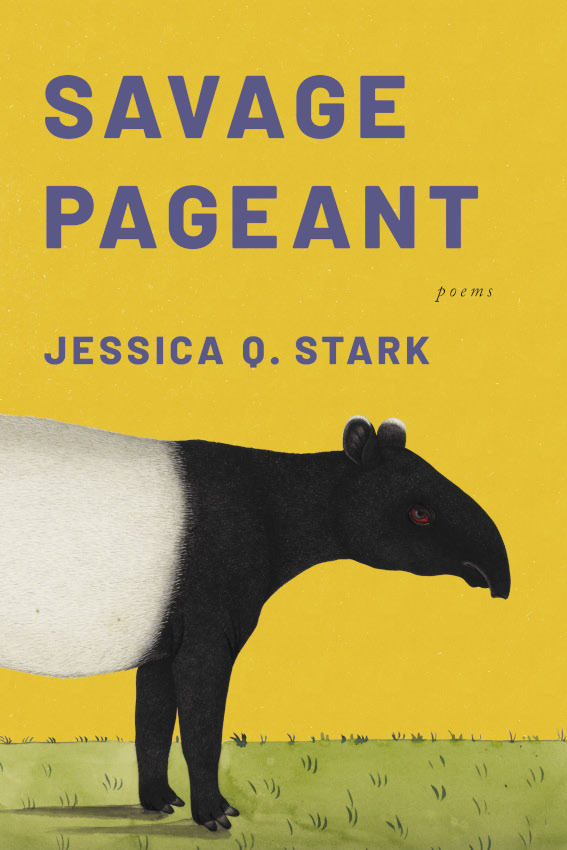
At the end of This Is All I Choose to Tell: History and Hybridity in Vietnamese American Literature, Isabelle Thuy Pelaud describes a potentiality for our work as diasporic Vietnamese artists. Hybridity projects. Fictions. Poetics. Directions and options and projects beyond memoir and war narratives. “. . . less holding back . . . perhaps more exploration.” Jessica Q. Stark’s Savage Pageant is just this sort of magic—a book that wholly and refreshingly defies easy categorization in so many ways. It commands a respect commensurate to its subject matter(s) and structure(s), lineage(s) and creator. I will attempt to explain what I mean.
Stark’s pageant centers at Jungleland in Thousand Oaks, California, a place at times celebrated, forgotten, and monetized. Jungleland opened in 1926 as a support facility for Hollywood movies, later becoming a theme park before closing in 1969. Examining Jungleland through a multiplicity of lenses (which Stark presents in wondrous array—latitudes, longitudes, elevations, historical timelines, sketches, genealogies, street-level Google car pinned images, to name just a few), we see spaces, places, persons, and a nation engaged in the business of “spectacle,” and dealing with the concomitant fragmentations and unravelings and erasures and commodifications.
The pageant connects and propels the reader beyond Jungleland as Stark turns our gaze to the genealogies that bring us right to the soil and a history bound up with conquest and Spanish land grants and suburbia, nationalism, forced labor, bankruptcy, and the ways in which highways can both shuttle spectators to a spectacle and shunt them away to other entertainments—other Disneylands and Knotts Berry Farms—other distractions and amusements.
Stark’s book questions, suggests, reveals, and obscures. It takes us to this specific history, and to a larger history, Guy Debord’s Society of the Spectacle, mass psychogenic illness, pregnancy, indigeneity, labor, and so much more.
From “Jungleland: A Genealogy, 1803-1915”:
1803: The owners of the ranchos frequently used Spanish-speaking Native American workers, many of them former mission residents, to till their newly acquired land. Native Americans report tyrannical tendencies in rancho owners and perform purification practices on the soil and the water used for farming, washing, and drinking. They warn of eventual drought in the territories. They have within themselves a kind of aesthetics of hidden things. Rancho boundaries compose the basis of California’s land survey system, and the names of ranchos remain on the maps of the area today.
From its cover art, “The Tapir,” to the marking of GPS coordinates, to poems about murdered sex workers, escaped panthers, captive elephants, polio vaccines, and the enigmatic and “spectacled” lion tamer Mabel Stark (not her real name), Savage Pageant compels us to consider and reconsider the strange beast(s) that we are and this strange system that reduces us to producers and consumers. Labor. Goods. Acquisitions. Assets and Liabilities. Beings bought and sold. As Stark writes, “Louis Goebel, trying to recover from financial strain caused by fire destruction to his inventory, buys and sells exotic animals from the site of Goebel’s Wild Animal Farm.” And then, “He acquires and sells an apex of 26 elephants in the span of a few months. When we accept slight amazement and, in the world of the imagination, it becomes normal for an elephant, which is an enormous animal, to come out of a snail shell. It would be exceptional, however, if we were to ask him to go back in it.”
Stark brilliantly juxtaposes these sorts of imaginations next to genealogical entries that anchor us in our destruction, even as they free us to disassociate and associate: “1945: Two-year-old Donnie Fletcher is mauled and killed by the Goebel’s pet panther on Pleasant Way Drive. The United States deploy two nuclear bombs on Hiroshima and Nagasaki, Japan.”

Brutal truths. As Stark reminds us, “Everything, even size, is a human value.” And: “But what a spiral man’s being represents! And what a number of invertible dynamisms there are in this spiral! One no longer knows right away whether one is running toward the center or escaping.”
Savage Pageant is a companion for our concurrent entrapment and escape. We can accompany the tapir into extinction, crushed and crushing both by and within the play, the pageant, the show. We can continue our path of exoticization and otherizing, via billboard, cell phone, hashtag, news reel, and meme. There’s a historical lineage here, stretching back to and beyond Diderot’s Encyclopedie through our Expos and World’s Fairs, where we stand—bystander and consumer and producer and promoter and promulgator—mouthing the words to “It’s a Small World After All,” while our steel bands and grids encircle the globe and we define ourselves most civilized and “them” as savage, forgetting our own cannibalism, as Stark reminds us.
In our current context(s) of remembering and forgetting, we need a book such as Savage Pageant more than ever—to gather our dismembered parts, to remind us of beasts that roam, and lacerations, and teeth, and leukemia, and maulings, and deserts, and canyons, and commercials, and gestation, and birth—and to trace, as with an invisible but tangible line, connections between our histories, our day-dreams, our afflictions, and our illusions as well as our imaginations and our phenomenologies.
Read Savage Pageant by Jessica Q. Stark. Read her conversation with Vi Khi Nao at Entropy. In her notes, Stark writes, “Lastly, I am indebted to Aracelis Girmay’s the black maria and Diana Khoi Nguyen’s Ghost Of for re-teaching me the mobility of death and trauma.”
In reading Savage Pageant, we are indebted to Jessica Q. Stark for so many thoughts and questions. For words such as these:
And now we are carving mythology out
of unremembered time. The recurrent
dream about Jungleland isn’t about
tigers or Mabel or a roster of poorly
behaving men. We know memory,
like a trapped lion, must snack on
dry sandwiches to survive.
It would be nicer to leave it alone,
the small lion to its tidy sandwich,
but here is the affliction
from stories better left unsaid…
Savage Pageant
Jessica Q. Stark
Birds, LLC, $18.00
Contributor’s Bio
Paul Bonnell was born in Buôn Ma Thuột, Vietnam. He has lived in the Philippines, Malaysia, and the United States. He teaches, coaches, writes, plays music, and climbs in northern Idaho, where he lives with his family. He is interested in poetry, essays, fiction, hybrid art, the Vietnamese Diaspora, the Chăm, the Bru, mountain culture, biopolitics, and transracial/transnational adoption.


